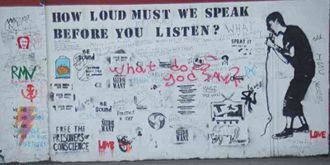What stakeholders want
Contents
Who are the stakeholders?
It is important to identify all stakeholders before conducting a consultation. Example of stakeholders: 433 Local Planning Authorities, all statutory consultees, parish councils and central government. [1]
We busted a gut! What for? I got a job … just a temporary post ... a few years ago, helping out with the [2] strategy ... and it was collecting information that had been retrieved from community groups and individuals (...) on how the service impacts on their day to day lives. And including providers and workers - so it was around wages, staffing, hours, costs, everything - the whole shebang ... I was new to that kind of field, right? And what I found was that everyone busted a gut for it, right? Fifteen hour days, people working around the clock for free, they gave up their [time] ... you know this was in addition to their normal jobs. Yeah right… so where did it go? I think we all know the answer. But there was a sort of a closing off process to that consultation process where the [senior executive] rounded up everyone involved and thanked them and there was one question asked that has always stuck in my mind and it was “Right, what happens all this now?” and that to me is the question, and the answer to the question was “Well, there is nothing we or you can do now, it's with our political masters”. And that was the answer.
So you know, fair enough that’s grand, three years later there hasn’t been an inch of change [arising from] any of that consultation [process], and you might say “Well, there is budgetary considerations, or time or politics or whatever” but the simple fact is there are repercussions from that consultation that I see on a weekly or monthly basis ... particularly in community workers and that’s where the cynicism is. We busted a gut! What for? It was a political move, they consulted us for political … political reasons.[3]
Naturally, stakeholders have expectations going into consultation processes. These include:
- Clear and relevant information on the issue being consulted. The amount of information offered by the consulter is also an issue. Too much information, particularly of a technical nature can act as a deterrent to participation.
- Resources available to the stakeholder are adequate for participating in the e-consultation. Consulters must be aware that conducting an e-consultation assumes that participants have access to technolology, as well as the knowledge to use the technology. Consulters should clarify these issues prior to entering into an e-consultation.
- That the consultation is relevant and important. Too many consultations or consultations on the most trivial subjects significantly impacts on the resources of stakeholders and can ultimately lead to apathy and consultation fatigue.
- A clear statement by the consulter on what impact consultation submissions will have on final outcomes. This is a critical point. Many times stakeholder have engaged in consultations only to be left with the impression that their views have been ignored or disregarded. A clear statement of the scope and context of the consultation prior to the beginning of the process can make sure that the expectations of stakeholders can be met and avoid feelings of dissappointment and frustration.
- Feedback on submissions. Many times stakeholders feel that decisions are pre-determined prior to the consultation and that their views are ignored. This view is compounded by a lack of feedback on their submissions. Even if thier views are rejected for various reasons, stakeholders expect them to have been considered. A feedback mechanism is therefore, crucial for consultation processes. Failure in this respect can result in future apathy by stakeholders.
Notes
- ↑ Planningportal.gov.uk
- ↑ Removed to protect confidentiality
- ↑ Source: Focus group discussant
